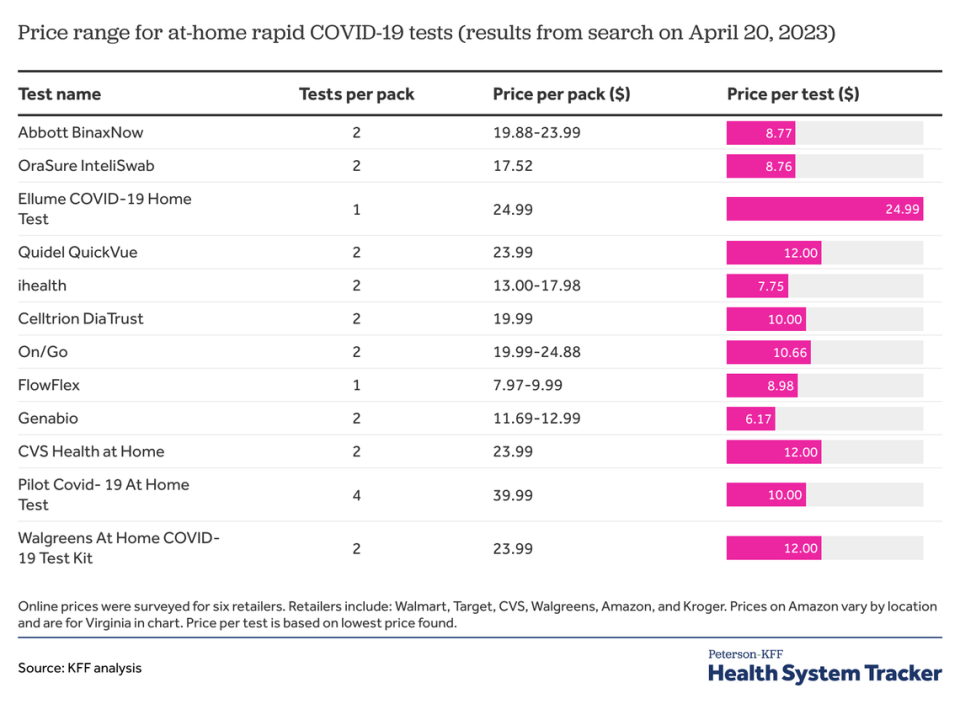How much do COVID tests cost now? What to know as cases and hospitalizations rise
Whether you’re already feeling sick or want to prepare for the cold season, here’s what you should know about buying a COVID test — at-home or PCR.
COVID-19 cases have been on the rise (though still relatively low, The New York Times reported) across the country. New variants have fueled worries as well, though updated vaccines are expected to be rolled out this month.
“Even before we hit (Labor Day) weekend we were seeing a significant rise in cases and hospitalizations,” Andrea Garcia, vice president of science, medicine and public health for the American Medical Association, said in a Sept. 6 podcast. “And while none of this sounds like great news, if we put it in context, we’re still down almost 61% in COVID hospitalizations compared to where we were last year at this time.”
Garcia said the rise of cases is expected to continue and there have been anecdotal reports of pharmacies seeing an increased demand for at-home and in-person COVID tests.
As of June 1, the COVIDtest.gov program was suspended. That program distributed 755 million free tests to two-thirds of American households.
If you already have one of those tests in a drawer and are worried about the expiration date, you can check it on the FDA’s List of Authorized At-Home OTC COVID-19 Diagnostic Tests. Most tests last between four months to two years. And some may be OK to use even if the expiration date has passed.
How to find a test?
If you don’t have health insurance and have COVID-19 symptoms or were exposed to someone with COVID-19, you can search for a free test near you through the U.S. Centers for Disease Control’s testing locator. That’s offered through the Increasing Community Access to Testing program.
Two other programs — through Health Resources and Services Administration’s health centers or the Administration for Strategic Preparedness and Response’s Test to Treat site — offer free testing for those without insurance.
CBS News reported some city and state health departments also offer free COVID testing.
In California, visit the state’s Department of Public Health at myturn.ca.gov/testing to find testing site near you. Then, click “learn more” to see if the location offers testing, requires an appointment or charges fees.

How much do tests cost?
Private health plans aren’t required to cover or reimburse COVID tests. That’s because the public health emergency ended in May.
If you have insurance, you can go online, to a pharmacy or store to buy an at-home test. If your insurance doesn’t cover it or offer reimbursement, you may have to pay out-of-pocket, according to the Centers for Medicare and Medicaid Services.
KFF — an independent source for health policy research, polling and journalism — found in May that the median price of a COVID test in an outpatient clinical setting was $45 in 2021 for people with large employer-based health coverage. For an antigen test, the median was $42 compared to $62 for PCR.
For at-home rapid tests as of April 20 the average was about $11 per test. Most of those tests cost between $12 to $24 per pack with two tests per pack, according to KFF. The total cost for a pack ranged from $8 for one test to $40 for four.
Self-pay cash prices for hospital-based COVID-19 PCR tests varied by state. In California, the median was $70 and in Washington state, the median was $113. Utah was the least expensive with the median at $41 and Alaska the most expensive at $200.
What is The Sum?
The Sum is your friendly guide to personal finance and economic news.
We’re a team of McClatchy journalists cutting through the financial jargon so you know how these issues impact your life. We verify information from diverse sources and keep the facts front-and-center, making finance and economic news add up for you.
Ready to take the first step to getting your finances under control? You can sign up for our five-week budgeting newsletter at thesum.news.

